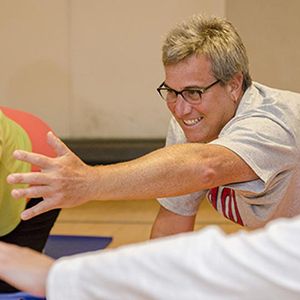
Colorful yoga mats dot the floor in the activities room of GW University Student Center during the gentle yoga class, where cancer patients and their families from all of the Washington, D.C. area come to reduce stress and achieve a sense of mindfulness.
When a person is first diagnosed with cancer, they may not be in the best mindset, and yoga is a way to decompress, says Aaron Wertlieb, a class regular.
After being diagnosed with prostate cancer, Wertlieb says his doctors at GW thought the class would help him manage both the stress of the diagnosis and the stress of his IT job at a downtown Washington, D.C. law firm. While at first skeptical about what yoga could offer him, Wertlieb says now he goes out of his way to make it to every class.
“When I miss a week, I really feel it physically and spiritually,” he says of the weekly sessions, which typically draw about eight to 12 people. “I try not to miss any because it really helps.”
Wertlieb points to class instructor, Yael Flusberg, as the center of his newfound dedication to yoga.
“I’ve heard a lot of people who take yoga say they have a lot of positive or negative experiences depending on the teacher. I think Yael has a special heart for the class and how she handles the people there,” he says.
That level of understanding, Flusberg says, always came naturally to her, but since her own breast cancer diagnosis in the spring it’s become something much more.
“Being diagnosed gave me insight and made me more mindful of the different phases of cancer. It’s really allowed me to open my heart,” she says.
Flusberg, a trained yoga therapist, Reiki teacher and board-certified polarity therapist at the GW Center for Integrative Medicine, says she works in a more therapeutic context than a regular yoga instructor.
She emphasizes relieving the stress that comes with being a cancer patient, and helping class members “find a place of relaxation and peace within a time of chaos [and] confusion,” Flusberg says.
It’s that approach that appeals to Wertlieb — that and the support the group’s members offer him. “I went through a lot of crazy stuff … last year,” he says, “and if it wasn’t for them I would have struggled with those things much more.”
Flusberg also understands the need for that support during instruction. She says when she started teaching the class four years ago, Jennifer Bires, LICSW, a clinical social worker and program coordinator who leads the cancer support groups program by The GW Medical Faculty Associates, told her: It’s not just about the yoga, it’s really another support group.
With that in mind, Flusberg says she tries to cultivate a sense of ease and friendship between the class members. They know when someone will be undergoing chemotherapy or when it’s someone’s last week of radiation. There’s always extra support offered from each member outside of the regular class hour, she says.
Gentle yoga, which has been around for about four years, is just one of many support groups offered through the GW Cancer Institute and the Katzen Cancer Center. Additional programs include the Caregivers’ Support Group, Nutrition Club, Young Adult Group, and Survivorship Series, among many others. All classes are free and open to the public.
“We try to have something for everyone, we want to make sure that no matter where someone is on the cancer continuum, that we have a group that they could benefit from,” Bires says.
“Cancer can be a pretty isolating experience, and all of our support groups allow people to find other people like them,” she adds. “It becomes an important part of their journey and makes something positive out of a bad experience.”
Wertlieb says he has yet to try any other classes, but he has seen some that interest him that he may yet join. He adds that he’s currently in a place where he’s glad he can do an activity as physical as yoga.
Flusberg understands that, and says one of her goals is to make sure class participants don’t feel like porcelain dolls. The class is not only about relaxation methods, but also focuses on balance and posture. In addition, Flusberg says, she wants students to feel comfortable in their own bodies, even as the cancer may be changing how they see themselves.
“[O]ften there’s a sense that the body has betrayed them. So, for me, the most important thing that I could do … is have people develop a sense of friendliness and relationship with their bodies,” Flusberg says.
It’s also a safe space to explore, Flusberg adds, and if a participant wants to try a more challenging positon, she will offer a modification. But, like in Wertlieb’s case, it’s also a great place for people who have never done yoga before.
Wertlieb says it has shown him how helpful the exercise can be. “I was definitely and little hesitant and skeptical, but I’m not anymore,” he said.
When a person is first diagnosed with cancer, they may not be in the best mindset, and yoga is a way to decompress.



